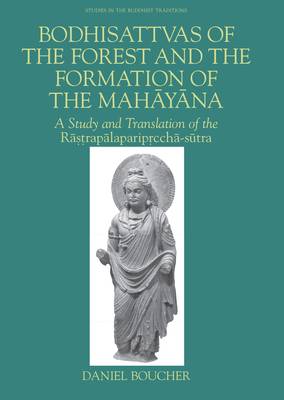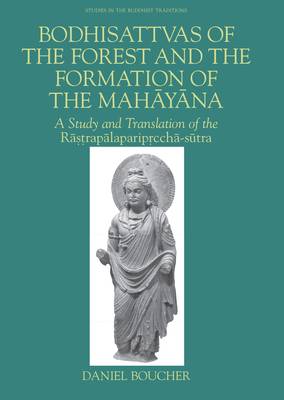
- Retrait gratuit dans votre magasin Club
- 7.000.000 titres dans notre catalogue
- Payer en toute sécurité
- Toujours un magasin près de chez vous
- Retrait gratuit dans votre magasin Club
- 7.000.0000 titres dans notre catalogue
- Payer en toute sécurité
- Toujours un magasin près de chez vous
Bodhisattvas of the Forest and the Formation of the Mahayana
A Study and Translation of the Rastrapalapariprccha-Sutra
Daniel BoucherDescription
Bodhisattvas of the Forest delves into the socioreligious milieu of the authors, editors, and propagators of the Rastrapalapariprccha-sutra (Questions of Rastrapala), a Buddhist text circulating in India during the first half of the first millennium C.E. In this meticulously researched study, Daniel Boucher first reflects upon the problems that plague historians of Mahayana Buddhism, whose previous efforts to comprehend the tradition have often ignored the social dynamics that motivated some of the innovations of this new literature. Following that is a careful analysis of several motifs found in the Indian text and an examination of the value of the earliest Chinese translation for charting the sutra's evolution.
The first part of the study looks at the relationship between the bodily glorification of the Buddha and the ascetic career--spanning thousands of lifetimes--that produced it within the socioeconomic world of early medieval Buddhist monasticism. The authors of the Rastrapala sharply criticize their monastic contemporaries for rejecting the rigorous lifestyle of the first Buddhist communities, an ideal that, for the sutra's authors, self-consciously imitates the disciplines and sacrifices of the Buddha's own bodhisattva career, the very career that led to his acquisition of bodily perfection. Thus, Boucher reveals the ways in which the authors of the Rastrapala authors co-opted this topos concerning the bodily perfection of the Buddha from the Mainstream tradition to subvert their co-religionists whose behavior they regarded as representing a degenerate version of that tradition. In Part 2 Boucher focuses on the third-century Chinese translation of the sutra attributed to Dharmaraksa and traces the changes in the translation to the late tenth century. The significance of this translation, Boucher explains, is to be found in the ways it differs from all other witnesses. These differences, which are significant, almost certainly reveal an earlier shape of the sutra before later editors were inspired to alter dramatically the text's tone and rhetoric. The early Chinese translations, though invaluable in revealing developments in the Indian milieu that led to changes in the text, present particular challenges to the interpreter. It takes an understanding of not only their abstruse idiom, but also the process by which they were rendered from an undetermined Indian language into a Chinese cultural uh_product. One of the signal contributions of this study is Boucher's skill at identifying the traces left by the process and ability to uncover clues about the nature of the source text as well as the world of the principal recipients. Bodhisattvas of the Forest concludes with an annotated translation of the Rastrapalapariprccha-sutra based on a new reading of its earliest extant Sanskrit manuscript. The translation takes note of important variants in Chinese and Tibetan versions to correct the many corruptions of the Sanskrit manuscript.Spécifications
Parties prenantes
- Auteur(s) :
- Editeur:
Contenu
- Nombre de pages :
- 312
- Langue:
- Anglais
- Collection :
Caractéristiques
- EAN:
- 9780824828813
- Date de parution :
- 02-09-08
- Format:
- Livre relié
- Format numérique:
- Ongenaaid / garenloos gebonden
- Dimensions :
- 150 mm x 229 mm
- Poids :
- 635 g

Les avis
Nous publions uniquement les avis qui respectent les conditions requises. Consultez nos conditions pour les avis.






